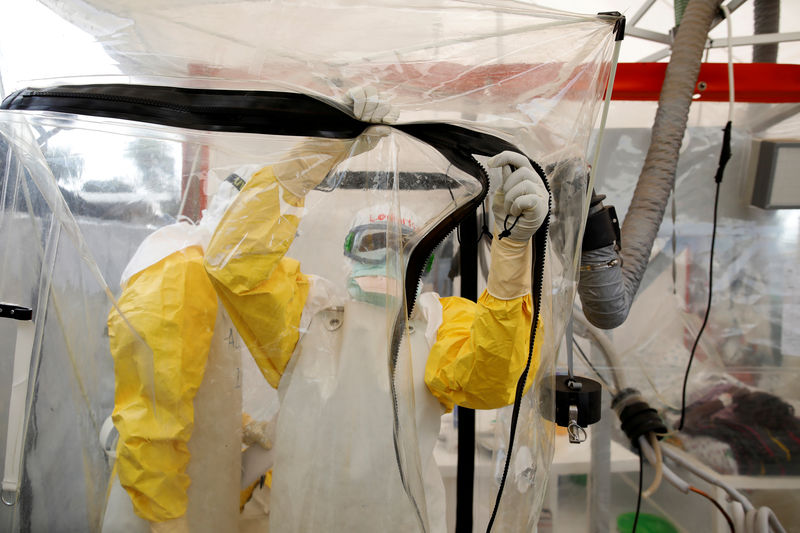By Alessandra Prentice
DAKAR (Reuters) - The World Health Organization and Congolese authorities are proposing changes to how some Ebola patients are cared for, new guidelines show, after a patient's death challenged the accepted medical theory that survivors are immune to reinfection.
There are many unanswered questions surrounding the circumstances of the woman's death in Democratic Republic of Congo, which has not previously been reported.
But it has raised concerns because the woman, whose name has not been released for confidentiality reasons, was thought to have had immunity after surviving infection, but fell ill again with Ebola and died.
"That was a big red flag event for all of us," said Janet Diaz, who leads the World Health Organization's clinical management team for the epidemic in Congo.
Congo's Ebola outbreak has infected over 3,000 people and killed more than 2,000 since August last year. It is the second-worst outbreak after one in West Africa between 2013 and 2016 that killed more than 11,000 people.
The woman was working as a caregiver in the high-risk "red zone" of a treatment center in Beni, eastern Congo, according to health officials familiar with her case.
She was one of dozens of people assigned to care for Ebola patients because it was assumed they would not get sick as Ebola survivors, although some researchers have considered reinfection to be at least a theoretical possibility.
Their presumed immunity allowed for closer contact with sufferers, many of them children.
Alima, the medical charity that co-ran the Beni center where she worked, said she tested positive for Ebola and died in July before she could be readmitted for treatment.
But it is not yet known whether the woman received a false positive result the first time she was tested, experienced a relapse or was reinfected, health officials say.
Medical experts say it could be years before Ebola survivors' immunity is fully understood. Yet the recent case is sufficiently worrying for health authorities to rethink how care should be provided to Ebola patients across eastern Congo.
The WHO and Congolese officials have drafted new guidelines, seen by Reuters, that warn that some Ebola survivors may have "incomplete immunity" and advise that additional measures should be taken to protect them from possible reinfection.
The new protocols would set limits on which Ebola survivors can work in treatment centers and standardize precautions that must be taken.
Survivors who had mild cases of Ebola and those who were found to have low viral loads - or lower levels of the virus circulating in their blood - while infected "need to be carefully assessed, as they may be at risk for having incomplete immunity after infection," the draft says.
Diaz said the protocols were still being discussed with health organizations and could change in the drafting process.
QUESTIONS ABOUT IMMUNITY
Efforts to contain the Congo outbreak have been hampered by militia violence and public mistrust, but aided by medical advances including new vaccines and therapies.
Ebola survivors, known as "les vainqueurs" – French for "the victorious" – have been at the forefront of treatment, offering vital care, especially to children.
Their assumed immunity has meant they could spend extended time with patients and provide much-needed human contact. The protective gear they must wear is lighter and less restrictive than that worn by other health workers.
But the draft protocols being discussed by health authorities would bar some survivors from working in the contaminated red zone.
These include people whose immune systems may be weaker because they are pregnant or because they have other infections such as HIV or tuberculosis, and those who had low viral loads during their Ebola infection.
The woman who died was pregnant at the time, which she had not disclosed to the treatment center, according to Nicolas Mouly, Alima's emergencies coordinator. But it is not known if that played a role in her falling sick again.
Mouly said Congo's biomedical research institute was running tests to learn more about the case. Officials with Congo's Ebola response and the institute did not respond to phone calls and text messages seeking comment.
In response to the case, health authorities have reviewed the clinical histories of all Ebola survivors working with Ebola patients, the WHO's Diaz said. They have also reminded treatment centers to ensure their employees are following biosafety rules.
Much remains unknown about how immunity works in Ebola survivors, including how treatments might affect a patient's susceptibility to reinfection.
"I think that's the big question: What is the true immunity of an Ebola patient who survived?" Diaz said. "Everyone's working very hard right now to both care for patients and also move science along."
There have been several confirmed cases of relapse with Ebola, including a Scottish nurse https://www.reuters.com/article/us-health-ebola-survivors/mystery-deaths-in-sierra-leone-spread-fear-of-ebola-relapses-idUSKCN0SF1YI20151021 who was infected in Sierra Leone in 2014 and fell ill again 10 months after recovery.
But the symptoms have tended to be localized in certain parts of the body and are not known to have been fatal, according to Raina MacIntyre, who heads the Biosecurity Program at the University of New South Wales' Kirby Institute.
No case of reinfection has been confirmed since the disease was discovered near the Ebola River in northern Congo in 1976.
Short-term immunity has largely been treated as a given. And a study of 14 survivors of the first documented Ebola outbreak in 1976 found that all were able to develop an immune reaction to at least one of three Ebola virus proteins 40 years later.

Alima's Mouly said the creation of a standardized set of rules for survivors working in treatment centers was a positive step, but recommended further measures to ensure the physical and mental well-being of all survivors.